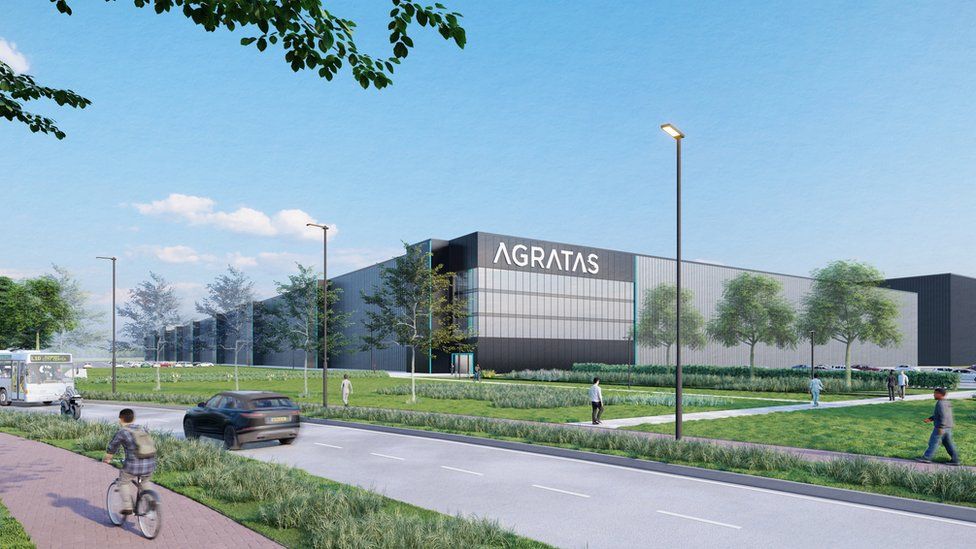Somerset gigafactory: 'It's going to be a wild ride'
- Published

Artists impression of the new battery factory near Bridgwater
"We're up for the challenge," said the boss of the company building Britain's biggest electric car battery plant.
"There hasn't been a project of this scale delivered on time in any recent history," added Tom Flack, CEO of Agratas, Tata Group's global battery business.
The company is working towards 2026 as an opening date for the £4bn factory.
But meeting that deadline "in the UK construction environment is quite a challenge," he told BBC Radio Somerset.
The American, who spent 14 years at Ford, said Agratas is "doing some cool things to try and overcome those challenges, with government and private sector construction [companies]."
But he admitted constructing the huge buildings, on the site of a former munitions factory near Bridgwater, Somerset, is "going to be a wild ride".
Agratas CEO Tom Flack is hoping to woo local people.
Mr Flack said the site has already been "transformed" in the last year.
They have started putting down the foundations of the buildings -12,000 large concrete pillars go below each one - and expect to go into the main construction phase "in the next few months".
Once they are built he said they will be "some of the cleanest buildings you'll ever be in" due to the demands of the batteries they will produce, initially for Tata's Jaguar Land Rover electric cars but also for other brands in future.
For local people, while the 4,000 jobs being promised at the factory are appealing, some are worried about the disruption their new neighbour might bring.
Tom Flack said they will be "collaborating" with the community in terms of "add-ons", "so there is a little bit of a gain with any pain that comes in the construction phase".
So how did they come to choose this brownfield site, surrounded by fields, a stone's throw from the M5?
"We had kept Somerset as our leading best location for about 18 months," Mr Flack said.
"It was really a question of: Can we make a factory in the UK work?"
"As you can imagine, bringing manufacturing back to the UK is a daunting challenge, something that's very important," he said.
The government confirmed last year Tata had been offered a "large" incentive to site the plant in the UK.
It is understood that the government is providing subsidies worth hundreds of millions of pounds.
They are likely to be in the form of cash grants, discounts on the cost of energy, and training and research funding.
The brownfield site was home to an ordnance factory for most of the 20th century
The site is sandwiched between two small villages: Puriton and Woolavington.
The vice-chair of Puriton parish council, Judith Fletcher, said most local people are "positive" particularly at the prospect of good, local jobs, but there are some who are "less enthusiastic".
"If they [Agratas] can carry on engaging with the local community and taking on any issues that might arise: noise, traffic, that sort of thing, that would be a good thing," she said.
On the jobs to come, and the people they will be looking to hire once the plant is up and running Mr Flack said it is "not really like a traditional factory."
"This is very advanced manufacturing so there are few traditional jobs; it's a lot more biased towards people with engineering [experience] or college degrees."
He said they are already working with the local college to develop relevant courses.
"We're going to show people this is potentially you: 'Laura mother of two' who's had some experience and is looking to do something different.
"These businesses live and die on their people."
Follow BBC Somerset on Facebook, external and X, external . Send your story ideas to us on email or via WhatsApp on 0800 313 4630, external .
Related Topics
- Published12 March
- Published28 February
- Published19 July 2023